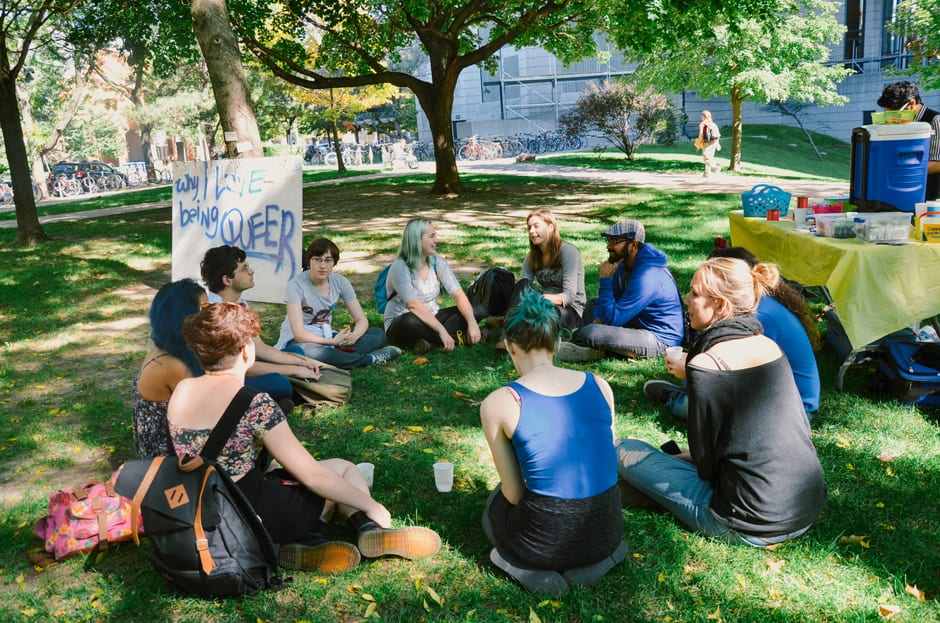Between September 19 and September 29, Queer Orientation brought new and returning students together through events at all three University of Toronto campuses. Queer Orientation invited students to engage in a variety of events exploring sexual and gender diversity and learn about getting involved on campus.
This year’s programming included open houses, meet-and-greets, and queer yoga. There were also new, innovative events such as GenderPoo, an art-based exploration of gender.
A team of staff and students from many on- and off-campus groups, including OUT@UTM, SC:OUT, LGBTOUT, and the Sexual & Gender Diversity Office (SGDO), worked together to organize the events.
“Diverse and inclusive communities”
According to Haley O’Shaughnessy, president of Rainbow Trinity, one of the main goals of Queer Orientation is “[allowing] first-years to become accustomed to the university environment before they get involved with the many queer clubs on campus.” For example, the Campus-to-Village tour and Queer Tea in Public Spaces helped students locate places to hang out and socialize in a safe and supportive environment, as well as learn queer and trans history within the university context.
Allison Burgess, the university’s sexual & gender diversity officer, said that Queer Orientation plays a critical role in building a strong university community. “Queer Orientation is important for students to help build LGTBQ communities across our three campuses and to help foster diverse and inclusive communities,” Burgess said, adding: “There are lots of events on the week’s program where all students can attend and learn something, such as meet-and-greet events and movie nights where anyone can come and listen, learn, and participate in LGTBQ-orientated programming.”
In addition to their support of Queer Orientation, the SGDO offers a number of services for students, faculty, and staff at all three campuses, including the Queer Students of Colour Discussion Group; the LGBTQ Students Group, which brings LGBTQ international students together for monthly social and educational events; and training and educational programs. The SGDO is also involved in the Washroom Inclusivity Project, which aims to provide clear and updated information about the university’s current washroom facilities.
LGBTQ advocacy
Originally founded as the University of Toronto Homophile Association in 1969, LGBTOUT, the oldest LGBTQ student group in Canada, also participated in this year’s events. According to Ben Donato-Woodger, the group’s public relations executive, LGBTOUT aims to be the major unifying queer group on campus. The group runs a drop-in center for LGBTQ students and engages in advocacy and event planning on campus.
Donato-Woodger said that Queer Orientation continues to attract attendees from a variety of backgrounds. “You get everybody. You meet people coming out for the first time in the safety of progressive Toronto. You meet people there to make friends. You meet activists. You meet people wanting to get involved on campus,” he said.
“The university has both a unique responsibility to advance equity as a centre for education, but also because of the opportunity it has to shape students positively at a formative time in their lives. Many people come out for the first time in the safety of progressive Toronto,” he added.
“Advancing equity”
Building an engaging community where experiences and struggles are shared and discussed was a central theme throughout Queer Orientation.
O’Shaughnessy said that, to overcome systematic forms of oppression, students, staff, and faculty must challenge heteronormative cultures and gender binaries within colleges, classrooms, and social spaces. For example, during Queer Orientation, participants put their preferred pronouns on nametags.
The Queer Students of Colour discussion also invited students to challenge racism, homophobia, and transphobia through discussions on how sexuality and race affects lives and communities.
Although pleased with progress made on campus in the past few years, Donato-Woodger said that the university must still actively work towards the development of a more equitable and inclusive atmosphere at U of T by challenging homophobia and transphobia, as well as sexism and racism.
“I hope LGBTOUT can continue growing, bringing students together, and advancing equity,” he added.
With files from Iris Robin


